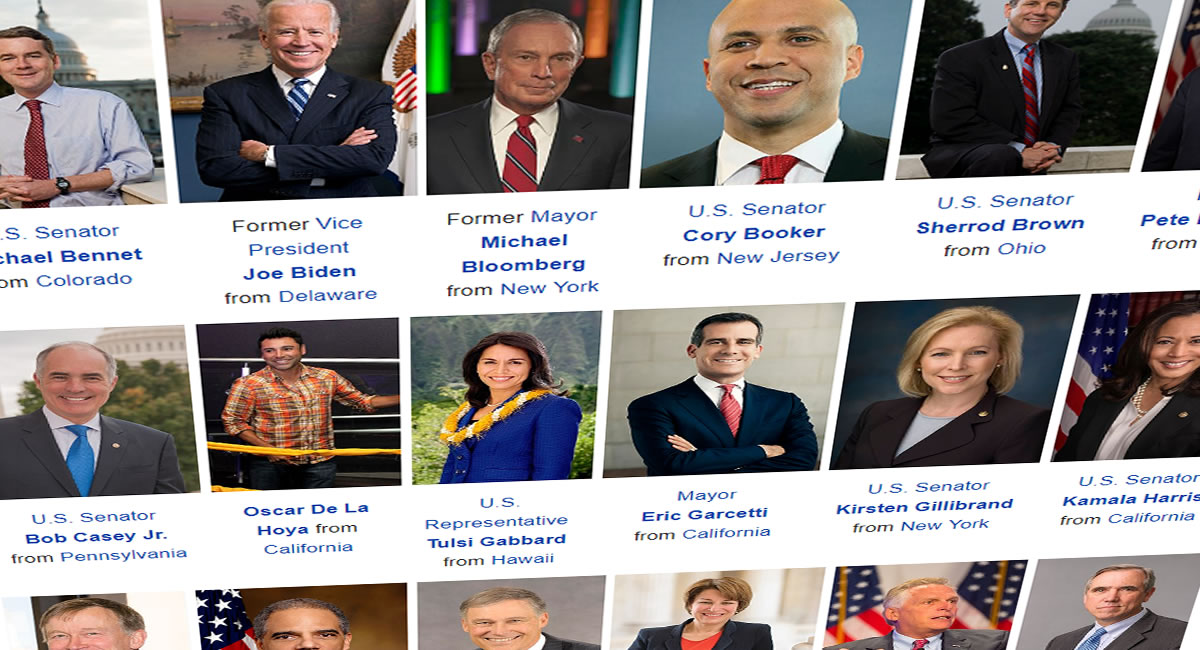
By Andy Brack, editor and publisher | South Carolina is poised to be a big player in determining the 2020 Democratic presidential contender.
 With the Palmetto State’s primary set to be in February 2020 before March Super Tuesday primaries across the country, South Carolina will be the first primary state where candidates will face off among a diverse blend of voters. Iowa and New Hampshire, the mostly white states that kick off the presidential process, don’t have the diversity that characterizes South Carolina and most of the rest of the nation.
With the Palmetto State’s primary set to be in February 2020 before March Super Tuesday primaries across the country, South Carolina will be the first primary state where candidates will face off among a diverse blend of voters. Iowa and New Hampshire, the mostly white states that kick off the presidential process, don’t have the diversity that characterizes South Carolina and most of the rest of the nation.
South Carolina is also historically more conservative than other states, which could be a good thing for the process, even for Democrats, as I related earlier in the week to an Australian journalist who called to chat about the election.
There will be all flavors of Democratic leaders running for president, from liberals like Sens. Elizabeth Warren or Bernie Sanders (who actually isn’t a Democrat) to more mainstream leaders, possibly including former Vice President Joe Biden. Just as Republicans had more than a dozen candidates in 2016, Democrats in 2020 will have a panoply from which voters can choose, potentially including big names like Sens. Cory Booker of New Jersey, Kamala Harris of California, Kristin Gillibrand of New York and Sherrod Brown of Ohio. Also mentioned have been everyone from Oprah Winfrey to two former mayors: Mitch Landrieu of New Orleans and Michael Bloomberg of New York.
But the ideal candidate, I suggested to the national reporter, would be someone who was not the “I am not Donald Trump” candidate, meaning that the best candidate likely would be someone who didn’t run on being against everything Trump is as president.
 The ideal candidate would be a Democratic moderate who would build a campaign that pulls together an unhappy, divided country while promoting a platform that pushes economic opportunity for all Americans. In other words, a unifier and economic pragmatist.
The ideal candidate would be a Democratic moderate who would build a campaign that pulls together an unhappy, divided country while promoting a platform that pushes economic opportunity for all Americans. In other words, a unifier and economic pragmatist.
A bold Democratic nominee might, for example, actually ask a moderate Republican to serve as vice president. That’s a risk, if the VP has big political aspirations that might conflict with a sitting president, but it has the potential to be a big win for a country hungry to be more than the Divided States of America.
Pundits lately have been preaching the gospel of economic populism as something the next Democratic candidate needs to have. But in a country where debt and partisanship are soaring along, doing what’s popular economically with voters might not be the medicine the country needs now.
Rather, it needs economic pragmatism – a bold, new course that blends generating economic opportunity for everyone, most of all those left out in the wealth creation of the last two decades, with practical measures that can do loads of good.
The folks at the centrist Third Way think tank might have hit on the right formula – a call to engage voters by building opportunities through a campaign based on economic policies that help people earn a good livings. Their notion blends the American value of hard work with a policy framework (building opportunity) that can be expressed in myriad ways. If Democrats are going to win in 2020, they have to express values as well as policies.
“By a 20 point margin, voters want government to focus on policies that spread opportunity to more and more people and places over addressing income inequality,” according to a Third Way treatise.
Third Way describes its opportunity agenda as creating a sweeping apprenticeship program to train workers for more sophisticated jobs, adding private retirement accounts, cutting taxes for low-income workers and developing regional minimum wage policies. They contrast their vision with a Trump-style approach to kill national health care, build a wall and engage in trade wars. And they differ with a Sanders-style agenda of Medicare for all, free college and a $15 per hour minimum wage.
When their agenda is compared with approaches by Trump and Sanders, Third Way says voters highly prefer building opportunity through work-related policies by double digit margins.
Bottom line: Combining an opportunity agenda in a pragmatic leader who focuses on unifying the country’s Democrats, Republicans and independents is exactly what the United States now needs.
- Have a comment? Send to: feedback@statehousereport.com.



My choice for Dem candidate is Sen. Amy Klobuchar. She has solid campaign experience, is in her mid-fifties. , is physically fit, has a nice smile.